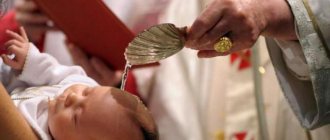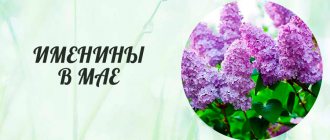What to name your son? Some are guided by the calendar, some by compatibility with the patronymic, some are looking for an original rare name, some choose among names of a certain origin... In any case, every name is beautiful and no matter what you decide on, your choice will be correct, after all, it is prompted by a loving heart. We invite you to pay attention to some native Russian and ancient Slavic names that resonate in the heart and subconscious at the level of sound and meaning, and create a stable spiritual connection between a boy of the 21st century and his real ancestors who lived on our land hundreds or even thousands of years before him ... There are many such names. A list of some of them with meanings is at the end of the article.
List of Slavic names for boys and their meanings:
Starting with the letter B
Bazhen - desired, dear Belogor - related to the heights of the spirit Beloslav - white, glorify Belovolod - just ruler Belozar - enlightened Belomir - pure in thoughts Belotur - light power Bogdan - given by the gods Bogorod - related to the gods Bogumil - pleasing to the gods Bogumir - bringer of peace Boeslav - glorious in battle Bozeslav - glorifying the gods Boleslav - pain Boris - fight, fight Borislav - fight, fight Borimir - fight, fight Boripolk - winner Boyan - fighter Blagomir - bringing good Blagoslav - good, glory Blagoyar - fair Bratislav - fight Bratimir - striving to the world Bretislav (Breslav) - who has gained glory Bronislav - to protect, protect Budimir - wake up - (wake up) and peace - (peace) Budislav - wake up - (wake up) and glory Bueslav - assertive Burislav - indestructible, like a storm
Starting with the letter B
Vasilko - royal Vaclav - the most famous Vedagor - knowledgeable Vedamir (Vedomir) - knowledgeable Vedislav - glorifying knowledge Velimir - veli - (great, big) and peace - (peace, peaceful) Veleslav - veli - (great, big) and slav Velibor - ready to achievements Wenceslav - the most famous Vitoslav - family glory Vladimir - vlad - (to own, power) and peace (peaceful), owning the world Vladislav - owning glory Vlastislav - owning the world Voibor - winning in battle Voislav - glorious warrior Voisvet - fighting for justice Vsevolod - all - (all) and volod - (to own); possessing everything Vsemil - dear to everyone, everything - (all) and mil - (darling) Vseslav - all - (all) and slav - (glory), all glory Vysheslav - higher - (height, tall) and slav - (glory) Vyacheslav – vyache – (more) and slav – (glory)
Starting with the letter G
Starting with the letter D
Dalebor - participant in military campaigns Danislav - given for glory Daniyar - given for brilliance Daromir - giving peace Daromysl - thinking, thoughtful Divislav - amazing Dobran - good-giver Dobrovit - life-loving Dobroslav - kind - (kind, good) and slav - (glory), good glory Dobrynya - kind, good Dragovit - valuing life Dragolyub - kind, beloved Dragomir - drag - (precious) and peace - (peaceful) Dragorad - joyful
What did the Slavs call born men?
The peculiarity of the Old Church Slavonic name is that it can be double. Such an unusual phenomenon reveals the various qualities of a person, as well as feats, skills, misdeeds and appearance. Examples of such Slavic names: Miroslav the Wise, Ratibor Obida, Vedomir the Righteous, etc.
The first name was given most often in order to scare away evil spirits and that is why it was not very beautiful, for example: Nekras, Zloba, Kriv. The second was named at an older age - youth, taking into account all the character traits that had time to manifest themselves. Such names, as a rule, were divided into several small groups:
Also, various prefixes were used in Old Slavonic names, such as “slav”, “wise”, “yar”, and to form an affectionate form they added suffixes: “yata”, “nya”, “tka” and others. Examples: Dobrynya, Putyata, Yarilka.
What do you consider when choosing?
Male Old Church Slavonic names were treated with special care. After all, it was boys who were always more desirable, unlike girls, because they were considered the continuers of the family, as well as bearers of wisdom and strength. With all this, there were also special and strictly observed rules:
- It was forbidden to give the father's name, because it was believed that this conveyed both positive and negative qualities of the father;
- repetition of names was prohibited;
- It was forbidden to use the names of deceased children or those people who died an unnatural death, as well as the sick (physically, spiritually) and drunkards, since it was believed that this could pass on to the child.
There was also such an unusual ritual. If a child was born without any signs of life and did not cry, they began to call him different Slavic names. The name to which he responded became his personal name.
List of options for a male child by month and their Old Slavonic meaning
Many of our ancestors followed a list of Slavic names that would be best suited for a particular month of the year, for example:
January
February
April
August
September
October
November
December
If you still decide to choose an Old Church Slavonic name for your son, then do not forget to take into account all these nuances. Think about how you would like to see your child in the future and help him fully reveal the character of the name he received.
Source
Origin and meaning of the Russian name Ivan - versions
- Ivan - from the sacred willow tree, revered by the Slavs, Celts and Greeks as a protector from evil forces and misfortunes, a tree that gives water (willows always grow near water) and an analogue of the World Tree on earth.
- Ivan = “man”, “born man”. In Sanskrit, whose common roots with the Russian language have been proven by a number of domestic and foreign researchers, including Svetlana Zharnikova, “jan” means “to be born,” and “jana” means “person.” By the way, it is interesting that in the same Sanskrit “dur” means “door”, and “dur-anta” means the door to infinity. A direct indication that the “fool” is a channel of communication with other worlds and cosmic wisdom.
- Ivan = "forest" (grove/tree/willow) or "source" from Sanskrit "vana". Or maybe the “tree of origin”? "World tree"? Here we again return to “man born”, in the meaning of “source”.
Artist: Viktor Korolkov. Sacred tree.
Thus, all three of the above versions complement each other, forming a coherent picture, from which it follows that “IVAN/YAN/VANYA” is the Primordial Man, the Foundation of the Fundamentals, the Source, the Born Man, who has a connection with the cosmos, that is, representing a microcosm , an analogue of the World Tree at a certain level of reality and existence. It is not surprising that this original name was included in all Indo-European languages (Iavan, John, Ioan, Johann, Johann, Jonas, Vano, Hovhannes, Jan, Janus, Jean, Juan, Juan, Ivo, Jen, Giovanni, Gan, Hans, John, Veni, Eni, Aeneas, Johan, Sean, Ion, etc.) and remained in them through the millennia, when people who had dispersed from a common ancestral home ceased to understand each other. It is interesting that the root “VAN” is clearly visible in some languages of the peoples of Southeast Asia, where it means “Prince, King, Master” - in particular, this is the title that the Chinese emperors bore... ___________ To summarize, it remains to say that no matter what name you you named your child - it will be wonderful, because it is your choice and His Name. And the origins of different names and naming traditions are interesting to study in any case, regardless of whether you plan to follow them - simply as one of the elements of the mosaic that makes up our history and culture.
"Winter" names for boys
Boys born in winter were not supposed to have a weak character. They are persistent, purposeful and independent. However, some features were imposed by the months of the year.
Those born in December received original names, carrying a touch of softness, but fulfilling the role of a leader in life. These are: Roman, Mikhail, Savva, Arseny, Nil, Clement and others.
There was also a custom to name a boy in accordance with the church calendar (according to Christmastide). For those born in the first half of December, Christmastide was advised to choose the name Nicholas, Yaropolk, Gregory. For the second half of the month - Anton, Kirill, Sergey, Stepan, Illarion.
August:
Ivan - pardoned by God. Yuri is a farmer. Felix is fertile. Theodosius - given by God. Stepan - crown, crown, ring. Semyon is a hearing person. David is a favorite. Nahum – comforting.
September:
Philip is a horse lover. Nicholas is the winner of nations. Yakov - following on the heels. Benjamin is the beloved son. Denis is the god of the vital forces of nature. Kirill - lord, ruler, sun. Michael is like God. Georgy is a farmer. Akim is God's praiser.
October:
Michael is like God. Adam - created from red clay. Savva - wiser, older. Sergey is a noble man. Peter is a rock, a stone. Prokop is proactive. Elijah is the power of God. Trofim is the breadwinner. Konstantin is constant, persistent. Innocent is innocent. Ephraim is prolific. Alexander is a protective husband. Felix is fertile.
November:
Oleg is sacred. Philip, Matvey - God's gift. Thomas is a twin. Kuzma is agile. Yuri is a farmer. Felix is fertile. Denis is the god of the vital forces of nature. Kirill - lord, ruler, sun. Michael is like God.
"Spring" names
Male names of Slavic origin, which are used to call those born in spring, are also conventionally divided by month.
March children are tender and vulnerable. They are usually talented but shy. Names will come in handy for them: Valera, Lenya, Arseniy, Denis, Kuzma, Evgeniy. On Christmastide, for those whose birthday is from March 1st to March 15th, Daniil, Kuzma, Illarion are suitable. From March 16 to the end of the month - Savva, Adrian, Efim.
April is the time when spring confidently moves across the planet. Boys born this month are agile, active, quick-tempered, but easy-going. The Slavs called them by names that are rare today: Khariton, Hypatius, Polycarp. More modern options are suitable: Vasily, Zakhar, Mark. According to the recommendations of the saints, boys born in April can be given rare Russian names: Dmitry, Tikhon, Makar, Efim. Those born after April 25th were often called George, Timofey, Mikhail.
Boys are born calm and obedient children in May. They are good students and helpers to parents. A little slow and thoughtful. The ancient Slavs called them Nicodemus, Clementius, Tryphon. Not so old options - Denis, Vsevolod, Vitaly. Christmastide recommends the names: Anton, Mark, Bogdan, with dates of birth after May 20th - Arsenia, Lavrentiy, Nikita.
What were boys named in Ancient Rus'?
In the stories and epics of Ancient Rus' that have survived to our time, strong and glorious wars, brave heroes, our glorious ancestors are mentioned. And their names were appropriate, spectacular and memorable, carrying all the power and wisdom of the Russian people.
The choice of names for boys was taken very seriously. The man was the head of the family, its face and breadwinner, although the woman also had a very serious role. Often the choice of name reflected family traditions. The boy was named after a close relative, grandfather or great-grandfather, uncle.
The unspoken principle of naming was that the relative in whose honor the baby was named should already be dead. The deceased became the patron and guardian of the child. If a boy was named after his father, it meant that his father died before the birth of an heir. Only in rare cases did this rule not apply.
The connection with the clan was incredibly important for the Eastern Slavs. Perhaps this is why even with the advent of Christianity, pagan names continued to be used. The name could be combined and made up of several. Such mergers of names are called two-base.
Let's take, for example, the historical names of the princes of the Rurik family:
- Svyatoslav.
- Yaropolk.
- Yaroslav.
- Mstislav.
The name could carry information about belonging to the future position held by the relative after whom the newborn was named. The name meant some action and always carried a semantic load.
The first and main part of the name was given to the child at birth, and the second was given when the main character traits of the baby were visible. But names were not always given according to this principle. The character of the child was important; they could give one name in infancy, and the young man would receive a second name when he showed himself and his character.
According to legends, this happened when the child turned 7 years old. It was at this age that the baby already showed himself as an individual. For example, the name Vsevolod is the one who owns everything. When the parents called the boy that, they made big plans for his future.
On a note. We can still understand the basics of many ancient names without special translations. To do this, it is enough to know the meaning of ancient words. For example, the name Stanislav means the formation of glory, the one who glorifies gives glory.
The root "fat" was often used in Old Russian names and denoted abundance and wealth for its owner. In pre-Christian times, boys were given 2 names. The parents named him first, that’s what they called him in the family and in everyday life. This name was used to communicate with people. And the second name was given to a boy when he turned seven years old.
Among the ancient Slavs, it was obligatory to observe the naming ritual; the child was named already at a conscious age, and until then he was called “child.” The ritual could be performed by a sorcerer or a midwife; they had a connection with nature and the gods. The sorcerer took the child into the forest, and there he watched and observed him for some time. Revealed its true essence and purpose and named it by the name given by the gods.
Only the closest people should have known this name, for the weakness and strength of a person was in this secret and sacred name. There were rules that said that if demons find out the secret name, they can do whatever they want to a person, and he will be weak and defenseless before them.
The main and frequently used roots for compound names were:
“ slav ” – glorious, glorified, bringing glory; “ world ” – big, huge, all-encompassing; “ volod ” – rich, possessing.
Similar publication: Why did they used to say not to educate, but to nurture?
There were names given by family occupation or by the type of craft of the ancestors. For example:
- Plowman.
- Blacksmith.
- Dulo.
- Fur coat.
They could also make up a name from the so-called words of power:
- Glory.
- Is it true.
- Good (Dobrynya).
Sometimes children were named after animals, natural phenomena or mythical characters:
- Hare.
- Pike.
- Quinoa.
- Lada.
They could give a name based on the child’s most striking feature, his outstanding manifestations of character:
- Noisy (noisy, restless).
- Silent.
- Malyuta.
- Besson - at first glance, derived from the root “demon”, but in fact it meant always cheerful, awake.
It also happened that children were named depending on the time of year or weather in which they were born, as well as the order of birth in the family:
- Freezing.
- Zarev (August).
- Secondary.
- Saturday.
Interesting fact! Many surnames of modern Slavs, Ukrainians, Russians and Belarusians originated precisely from old Russian names. People like Bezrukov, Dobronravov, Mirolyubov and there are countless examples.
There have been cases where boys were given names with unfavorable energy. Such names were a tribute to tradition and superstition. They believed that having such a name as Nelyub, Neustroy, Nekras, Tugarin, evil spirits would not pay attention to such a child and would bypass him from troubles and misfortunes.
A ritual was also carried out when the boy Zlotoslav was taken out of the house, and Rottentooth was brought into the house. Saying at the same time: “The beloved child was thrown out of the threshold, his place was taken by an unnecessary one, not just anyone, another.”
Faith was a very important part. Many Old Russian names contain the names of Old Russian pagan gods. For example, the name Jaromir has in its root the name of the Sun God Yarilla, the second part means the world. Literally, the meaning of this name can be interpreted as bringing light and peace.
Summer names - for fidgets and inventors
Boys born in summer are drawn to everything new and unknown. In June, according to Slavic traditions, they are called Nikitas, Kostya and Stepans. According to church canons - Daniel and Fedor.
July natives love communication. They are trusting and kind. Slavic names with specific meanings await them: Boris, Anton and Makar. Also recommended: Samson, Stanislav and Evsey. Christmastide suggests naming boys Ivans, Timofeys, Mikhails, Josephs.
August guys are charismatic and cheerful. It’s as if sonorous names were invented for them: Makar, Anton, Borya. The church calendar suggests choosing beautiful options: Maxim, Efim, Matvey.
How to choose a name for your son according to the calendar
The tradition of naming children according to the calendar exists in many Orthodox families. Sometimes birthdays come with forgotten names that are not customary to give in the modern world, so you can look at the coming days.
The saint in whose honor the baby is named is chosen as his patron for life. A child cannot be given a name that is not in the calendar during baptism.
All Orthodox male names are wonderful, but sometimes it is difficult for parents to make a choice. In this case, priests advise re-reading the lives of the saints after whom the baby may be named. If the reading does not inspire you, before baptism you can consult with the priest and name the newborn with his blessing.











